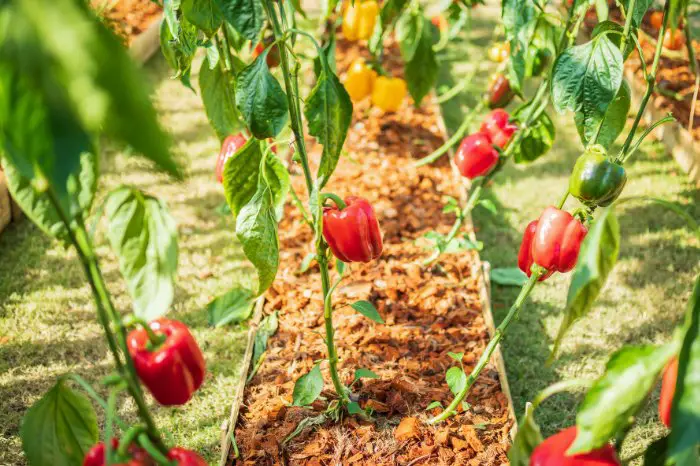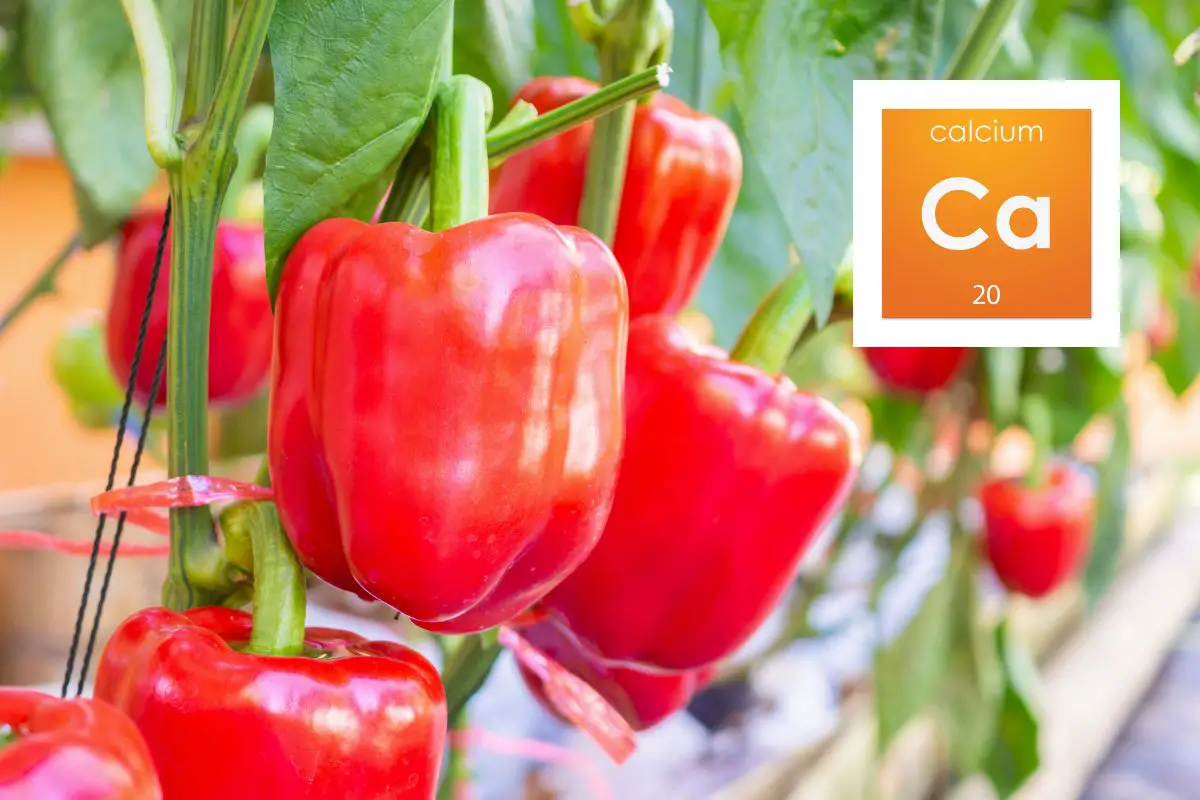Last Updated on December 30, 2022 by Cristina
Pepper plants are one of the best plants to grow because fresh peppers are better than any other pepper. Pepper plant calcium deficiency will cause the peppers you get will tend to be smaller and smaller and your growth shoots will turn into mush and your pepper gets stunted or dies. Follow more to learn how to treat a pepper plant calcium deficiency.
Why Do Pepper Plants Need Calcium?
Calcium is an essential nutrient for all plants. In plants that produce fruit, the fruit wall is given strength by the formation of calcium pectate that holds the cell walls together and makes them firm. As a fruit ripens, pectinase enzymes destroy the pectin, release the calcium and the fruit becomes soft and ripe. In the case of peppers, a “ripe” mushy pepper is undesirable. We want a pepper to be firm and crunchy. In this regard, making sure our pepper plant has enough calcium is critically important.
What Is Calcium? – Pepper Plant Calcium Deficiency
Calcium is a metal. When it reacts with other chemicals it typically ionizes and forms an ionically bonded substance. If this is calcium chloride, for example, calcium has a charge of 2+ when ionized, so it will react with two Chlorine molecules that have a charge of 1- when ionized. Calcium chloride is very soluble and I often use it as a soluble calcium source in nutrient formulations I mix. For garden systems I am not fond of calcium chloride, as it can make soil salty – chloride is a largely useless ion to plants. Hence if I were to choose a calcium ion solution to add to soil I would use calcium nitrate. This is very soluble.
However, there are many natural sources of calcium that can provide slow-release calcium sources, and the best of these is bone meal. Bones contain calcium – animals eat plants, and accumulate calcium from the plants. This calcium is used to create bones. When animals die, bones of some other sort, return to the soil. This returns the calcium to the soil. Plants absorb this calcium and animals eat the plants and the cycle continues.
Click Here to Get Info About:
- Black Spots On Basil Leaves – Learn How To Avoid Spotty Leaves
- Types Of Outdoor Water Spigots – Facts On Tap
Do Pepper Plants Need Calcium?
Yes. Pepper plants have a very heavy nutritional demand for nitrogen, potassium, phosphorous, and calcium among other minerals. They have relatively shallow roots, and, without regular feeding tend to deplete the soil around the plant to the point where very little remains in the soil. At this point, when calcium deficiency starts to become apparent you will start to see peppers that are stunted, that become prone to fungal infection in the tips of the fruit. If it gets worse they will rot.
As the calcium deficiency increases in intensity, the peppers and even the growth tips of the pepper plant begin to suffer, and you will find that you get very few peppers. My target when growing any peppers is that I want to have really big beautiful juicy pepper fruits with thick fruit walls that are nutritious for me to eat.
If a pepper looks beautiful and has a nice waxy surface I tend to find the fruit tastes great. As the soil gets depleted, peppers get stunted and just taste less pleasant. One of the most common causes of this decline in fruit size, fruit taste, and yield is pepper plant calcium deficiency. Luckily this problem is quite easy to fix.
Down to Earth Liquid Calcium Fertilizer Organic Water Soluble 5%, 1 Quart
How To Fix Calcium Deficiency In Pepper Plants
A pepper plant calcium deficiency is relatively easy to avoid if you prepare your soil correctly. They always say that prevention is better than a cure. Let’s look at how I typically deal with pepper plant calcium deficiency by avoiding it.
Sources Of Calcium For Pepper Plants
Healthy soil is something you build over time by adding various nutrients and creating a cycle that provides plants with what they need. Pepper plants thrive in healthy well-balanced compost-rich soil with a thick mulch layer and many earthworms. When I build a soil bed for peppers, I typically aim to have soil that can nourish peppers for two to three years – in my area the peppers can often survive this long outdoors. The first year, your plants grow and you get a late-season crop. In the second year, they start in spring and continue producing until mid-winter. In the last year, they produce smaller fruits but start early in the season. I find that if my soil is not correctly formulated, I tend to pick up calcium deficiency in the second year.
If we look at the soil cycle, slow-release calcium such as bones, and bone meal are an ideal way of ensuring that the calcium weathering process in soil provides a slow release of calcium over a long period of time. Soil microbes and fungi such as Trichoderma assist in the solubilization of calcium and phosphate from bones. Gypsum is also a soil enhancer that slowly weathers to release calcium for plants.
Peppers should be mulched with organic matter, and you have to keep feeding this mulch layer. I often lift the mulch layer up and place a few teaspoons of bone meal near the base of the plant. This nourishes the feeder roots.
How To Add Calcium To Pepper Plants – Pepper Plant Calcium Deficiency
If you find yourself in a situation where you have not prepared your soil correctly and you find you have a pepper plant calcium deficiency, you can correct this in a number of ways. A number of bone meal fertilizer spikes placed around the pepper plant help. It is important to mulch pepper plants, and you will find that they concentrate their feeder roots on the surface below the mulch. Only young roots absorb calcium, hence do not stick the spikes too deep in the soil. I actually would put them at an angle in the surface two inches below the mulch. This is where the feeder roots concentrate.
There is a good chance that if your soil is calcium deficient that it probably also has issues with iron and magnesium. I would suggest using a liquid fertilizer. These are short-term fixes and do not substitute for building proper living soil.

In Conclusion – Dealing With Pepper Plant Calcium Deficiency
It is relatively easy to avoid a pepper plant calcium deficiency if you build healthy soil that has soil microbes and slow-release calcium sources such as bone meal and gypsum. Peppers are heavy feeders and should be mulched with organic matter and manure, and bone meal can be fed in the top few inches of soil where the young feeder roots that absorb calcium are concentrated.
A healthy soil built this way will produce the best-tasting and looking peppers. If you have not built healthy soil, you can use liquid calcium supplements. I tend to recommend here that if you have a calcium deficiency, there will most likely be an iron and magnesium deficiency too, hence a Cal-Mag Fe type supplement helps.
Dr. Garth A. Cambray is a Canadian/South African entrepreneur and beekeeper with 28 years of experience in apiculture and specializes in adding value to honey. His Ph.D. research developed a new advanced continuous fermentation method for making mead that has resulted in a number of companies globally being able to access markets for mead. His company, Makana Meadery, exports honey mead to the USA where it is available to discerning connoisseurs. He has also developed technologies to commercially manufacture organic honey vinegar in Zambia for export globally. He holds a few patents globally in the ethanol industry and believes in technology and knowledge transfer for human development and environmental sustainability. One of his proudest achievements is the fact that the wind farm he started at one of his old apiary sites has essentially made his hometown carbon neutral.



